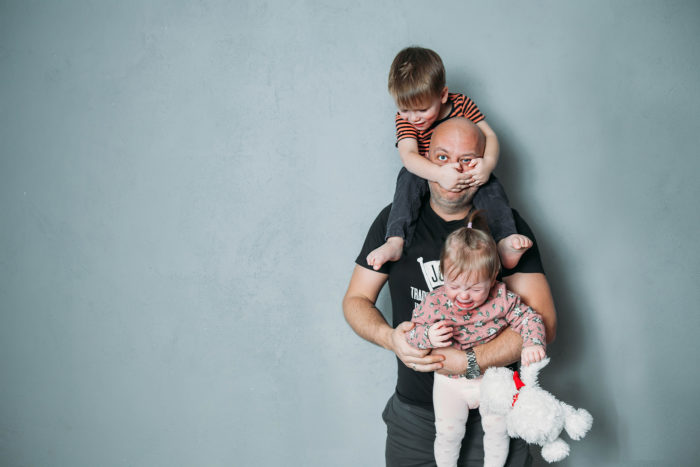Raising another human being is brutal work. It requires us to face ourselves and grow beyond our fears, doubts, and insecurities. Like the cocoon before the butterfly, parenthood is an intense transformational phase of life. We cannot stay the same we entered into it — it changes you — for better or for worse. Unfortunately for many of us, we fear it’s the latter.
Sometimes the inspiration that once flooded our veins the first time we held our newborn children is worn down over the years with the monotony of daily responsibilities. Sometimes we feel like there’s a gap between the kind of parents we wanted to be and the parents we are becoming. Sometimes we let key moments we wanted for our children slip through our fingers.
Nobody escapes parenthood intact — it breaks us all down.
As loving parents, none of us measure up to our own expectations. This means we’re not alone in our grief or disappointment. It also means these feelings are not signs of failure. Struggle is the unique process of parenthood. It’s nothing to feel ashamed about, to judge yourself over or to fear judgment from anybody else. Breaking down is a sign something new is now breaking through.
“Vulnerability isn’t so much about allowing others in as it is about letting you out.”
—Brian Andreas
The cracking open of ourselves brings to the surface our own patterns of attachment, childhood trauma, and emotional baggage and triggers we still carry around with us. It exposes our unhealed wounds and the inner work we still need to do to integrate them. If we don’t look away, but stay open to the uncomfortableness, it changes us and pulls us inside out. Support from a trusted friend, spouse, or community can help.
Sometimes, we just need to say out loud, “I feel empty inside”, “disappointed with myself” or “overwhelmed with my life” before we begin to move forward. Holistic change starts with a deep acceptance of our own fears, doubts, and insecurities. As Brené Brown observed, “It’s impossible to love our children more than we love ourselves. We cannot give to our children what we do not have ourselves.”
No judgment.
No shame.
Just grace.
And honesty.
If you haven’t ever known this kind of acceptance by experience, reach out for help, ask for recommendations, find a good counselor. Your inner acceptance is the foundation everything else is built on. You showing up for you is how we learn how to show up for our children. It’s only from this secure place we can begin to make practical adjustments to larger principles of parenthood. Without this acceptance, the loftier our vision, the sharper the weapon of shame and defeat. For more on this foundational inner work, I recommend picking up one (or all!) of these amazing books:

The Relational Soul: moving from the false self to deep connection

The Power of Vulnerability: teachings on authenticity, connection, and courage

Parenting from the Inside Out: how a deeper self-understanding can help you raise children who thrive
Making respect the priority for parenting.
There’s a popular myth that suggests the only way to get real respect is to demand it. You might hear someone say, “Let them know who’s boss or they’ll walk all over you.” But the result is fear, not respect; it doesn’t cultivate trust, and certainly, not love. The truth is no one can give you respect that you don’t first give out yourself. We can’t demand respect from our kids, we can only model it by giving it to them first. And if we’ve started our own inner work, we have a foundation of resources to generously pull from.
Right now there’s a paradigm shift happening in our culture on the verge of a name. You’ve probably already heard terms like gentle parenting, attachment parenting, peaceful parenting, or conscious parenting. Each addresses the simple idea of treating children the way you would want or needed to be treated when you were a kid. Personally, I prefer the term respectful parenting.
To be a respectful parent simply means you treat your children as whole human beings, automatically giving them the same level of dignity and respect you would give to any other person.
Imagine if we always treated children with full human-sized respect. How would life be different if you were treated this way as a child? Or our parents? Would an entire generation better empathize with the rest of the world because they experienced a deep and holy respect during their most formative years? I think so; we’re on the verge of a parenting reformation.
As we near a cultural tipping point, there is now more solid verifiable research (thanks to the work of Dr. John Gottman, Dr. Daniel Siegel, Brené Brown and many others) and practical resources available (Janet Lansbury, Lori Petro, Dr. Laura Markham and more) to articulate important aspects of this new parental landscape.

I’ve started putting together a list of themes and shared values to help explore what respectful parenting might look like in practice. If this has been the preface, you can think of the next one as the table of contents to give an overview and introduction to each upcoming chapter.
Just remember, being available and present is enough to be what your kids needs. Everything else grows from showing up.
0 Comments